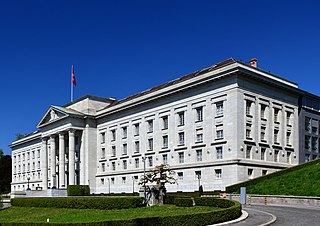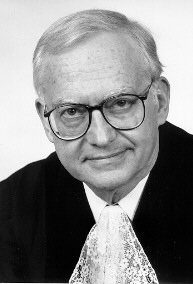Dispute resolution or dispute settlement is the process of resolving disputes between parties. The term dispute resolution is sometimes used interchangeably with conflict resolution.

The Permanent Court of Arbitration (PCA) is a non-UN intergovernmental organization located in The Hague, Netherlands. Unlike a judicial court in the traditional sense, the PCA provides services of arbitral tribunal to resolve disputes that arise out of international agreements between member states, international organizations or private parties. The cases span a range of legal issues involving territorial and maritime boundaries, sovereignty, human rights, international investment, and international and regional trade. The PCA is constituted through two separate multilateral conventions with a combined membership of 122 states. The organization is not a United Nations agency, but the PCA is an official United Nations Observer.
International human rights law (IHRL) is the body of international law designed to promote human rights on social, regional, and domestic levels. As a form of international law, international human rights law are primarily made up of treaties, agreements between sovereign states intended to have binding legal effect between the parties that have agreed to them; and customary international law. Other international human rights instruments, while not legally binding, contribute to the implementation, understanding and development of international human rights law and have been recognized as a source of political obligation.
List of international public law topics:
A fair trial is a trial which is "conducted fairly, justly, and with procedural regularity by an impartial judge". Various rights associated with a fair trial are explicitly proclaimed in Article 10 of the Universal Declaration of Human Rights, the Sixth Amendment to the United States Constitution, and Article 6 of the European Convention of Human Rights, as well as numerous other constitutions and declarations throughout the world. There is no binding international law that defines what is not a fair trial; for example, the right to a jury trial and other important procedures vary from nation to nation.

The Federal Supreme Court of Switzerland is the supreme court of the Swiss Confederation and at the head of the Swiss judiciary.
A quasi-judicial body is non-judicial body which can interpret law. It is an entity such as an arbitration panel or tribunal board, that can be a public administrative agency but also a contract- or private law entity, which has been given powers and procedures resembling those of a court of law or judge, and which is obliged to objectively determine facts and draw conclusions from them so as to provide the basis of an official action. Such actions are able to remedy a situation or impose legal penalties, and they may affect the legal rights, duties or privileges of specific parties.
International arbitration is arbitration between companies or individuals in different states, usually by including a provision for future disputes in a contract.

Gerard Niyungeko was a Judge of the African Court on Human and Peoples' Rights, a position he was appointed to in 2006.

Stephen Myron Schwebel, is an American jurist and international judge, counsel and arbitrator. He previously served as Judge of the World Bank Administrative Tribunal (2010-2017), as a member of the U.S. National Group at the Permanent Court of Arbitration, as President of the International Monetary Fund Administrative Tribunal (1993–2010), as President of the International Court of Justice (1997–2000), as Vice President of the International Court of Justice (1994–1997), and as Judge of the International Court of Justice (1981–2000). Prior to his tenure on the ICJ, Judge Schwebel served as Deputy Legal Adviser to the U.S. Department of State (1974–1981) and as Assistant Legal Adviser to the U.S. Department of State (1961–1967). He also served as a professor of law at Harvard Law School (1959–1961) and Johns Hopkins University (1967–1981). Judge Schwebel is noted for his expansive opinions in momentous cases such as Legality of the Threat or Use of Nuclear Weapons, Military and Paramilitary Activities in and Against Nicaragua and Oil Platforms .

Arbitration is a form of alternative dispute resolution (ADR) that resolves disputes outside the judiciary courts. The dispute will be decided by one or more persons, which renders the 'arbitration award'. An arbitration decision or award is legally binding on both sides and enforceable in the courts, unless all parties stipulate that the arbitration process and decision are non-binding.

An arbitral tribunal or arbitration tribunal, also arbitration commission, arbitration committee or arbitration council is a panel of unbiased adjudicators which is convened and sits to resolve a dispute by way of arbitration. The tribunal may consist of a sole arbitrator, or there may be two or more arbitrators, which might include a chairperson or an umpire. Members selected to serve on an arbitration panel are typically professionals with expertise in both law and in friendly dispute resolution (mediation). Some scholars have suggested that the ideal composition of an arbitration commission should include at least also one professional in the field of the disputed situation, in cases that involve questions of asset or damages valuation for instance an economist.
Alternative dispute resolution (ADR), or external dispute resolution (EDR), typically denotes a wide range of dispute resolution processes and techniques that parties can use to settle disputes with the help of a third party. They are used for disagreeing parties who cannot come to an agreement short of litigation. However, ADR is also increasingly being adopted as a tool to help settle disputes within the court system.

Justice Jean-Paul Beraudo is a lawyer, academic and author of legal works. He was Justice at the French Supreme Court and vice-chairman of the International Court of Arbitration. He lectures on International Private Law and International Trade Law at Panthéon-Sorbonne University and on Company law at Sciences-Po, Paris. The International Institute for the Unification of Private Law (UNIDROIT) appointed him correspondent for France and a member of the scientific committee.
Alan Vaughan Lowe QC is a barrister and academic specialising in the field of international law. Chichele Professor of Public International Law in the University of Oxford, and a Fellow of All Souls College, Oxford, 1999–2012; Emeritus Professor of International Law and Emeritus Fellow of All Souls College, University of Oxford, since 2012. He was called to the Bar of England and Wales at Gray's Inn, of which he is a Bencher, in 1993 and appointed Queen's Counsel on 28 March 2008. He practices from Essex Court Chambers, London. He is a member of l'Institut de droit international.
Armin von Bogdandy is a German legal scholar. He is director of the Max Planck Institute for Comparative Public Law and International Law in Heidelberg and Professor for Public Law, European Law, and International and Economic Law at the Goethe University Frankfurt. Armin von Bogdandy's research centers on the structural changes affecting public law, be they theoretical, doctrinal, or practical.
The Max Planck Institute for Comparative Public Law and International Law is a legal research institute located in Heidelberg, Germany. It is operated by the Max Planck Society.
The judiciary of Luxembourg comprises a number of courts.

Monica Feria Tinta is a British-Peruvian leading barrister, a specialist in public international law, at the Bar of England & Wales. She practises from Twenty Essex, London. "The Lawyer" magazine featured her in its "Hot 100" 2020 list, as amongst "the most daring, innovative and creative lawyers" in the United Kingdom. She has also been shortlisted as "Barrister of the Year" by the Lawyer's Awards 2020, alongside Lord Pannick QC, one of the UK's highly regarded advocates.
Cesare P.R. Romano, is an Italian and American international law scholar, known as an authority on international law, international courts, and international human rights. He is a Professor of Law at Loyola Law School Los Angeles.






